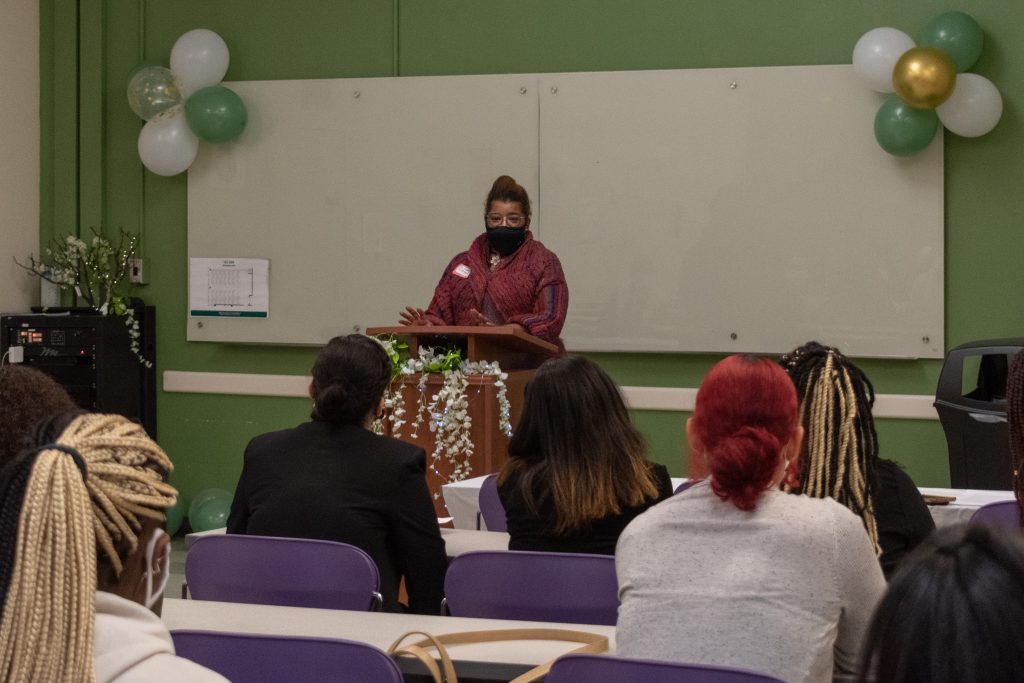Powerful United Ladies Striving to Elevate (PULSE) hosted its 11th-annual Women Educating, Elevating and Empowering (WE3) Leadership Conference on Friday.
The event, titled “Hidden Figures: Women in STEM,” featured a keynote speech from Sharon Bryant, the associate dean for diversity, equity and inclusion for Decker College of Nursing and Health Sciences, tabling from on-campus science, technology, engineering and mathematics (STEM) clubs and organizations as well as a student panel.
Nyah Suarez, the PULSE vice president and a senior majoring in psychology, said the goal of the organization’s annual conference is to exhibit its three E’s — educate, elevate and empower.
“Binghamton [University] can be pretty tough sometimes, especially if you’re in a STEM field — especially if you don’t have a lot of people looking like you within your classes,” Suarez said. “This is an event that I wanted to have just to be able to inspire and tell those people that are feeling less motivated that, ‘No, you got this. You can keep going.’”
Bryant’s keynote speech centered around her experience as a Black woman in higher education, how she was able to balance motherhood with her professional life and a reflection on what she has done throughout her career thus far.
Bryant works with organizations that create pipelines for young underrepresented students to work their way into STEM fields in higher education. One such organization is the Collegiate Science and Technology Entry Program (CSTEP), a state-funded program with a branch that operates in the Binghamton area. Bryant said two twin girls she mentored as adolescents just recently entered into doctoral programs.
She also acknowledged that although programs like CSTEP and the New York State Equal Opportunity Program (EOP) are beneficial for underrepresented students, more work is needed to ensure that educational institutions are more accessible, especially for Black, Indigenous and People of Color (BIPOC) students.
“As BIPOC students, you should not have to be turning yourself into pretzels trying to fit into this system, trying to make it work for you,” Bryant said. “I want to work with the system. I’m really trying to think about ways to make the system much more flexible to allow for difference, to allow for students showing up in different ways and requiring certain kinds of supports in order to be successful.”
Bryant said in her specialized field of sociology, there are typically more women present than in STEM fields. She said she used to bring her young son with her into work, and that, due to the more flexible nature of a university job and the fact that she was surrounded by so many women, “No one said one word about it.”
However, Bryant said she is the only African American tenured faculty member in Decker College. She has been at Decker College since 1998.
“How can that be?” Bryant said. “And I’m not even a nurse — I’m a medical sociologist.”
Intersectionality, or the overlapping of one’s several social categorizations such as race, gender and socioeconomic status, was an important theme of the student panel discussion.
The panel consisted of six women of color. They discussed the expectations versus the reality of their fields of study, advice they wish they had received before going into their selected major and how they stay motivated in school.
Many of the panel members noted that if they were not the only woman in their class, they were often the only person of color, or vice versa.
Daniella Ramos, a senior majoring in biomedical engineering, said she is the only Hispanic person in her major for her class year. She shared what keeps her motivated when her classes get tough.
“Just because something is hard doesn’t mean that you’re not capable of it,” Ramos said. “Trust the process. You’ll get there. Everything is not going to be as easy as you thought it would be, even if you do enjoy the subject. It can still be challenging, and those two things can coexist.”



